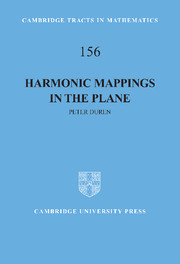Book contents
- Frontmatter
- Contents
- Preface
- 1 Preliminaries
- 2 General Properties of Harmonic Mappings
- 3 Harmonic Mappings onto Convex Regions
- 4 Harmonic Self-Mappings of the Disk
- 5 Harmonic Univalent Functions
- 6 Extremal Problems
- 7 Mapping Problems
- 8 Additional Topics
- 9 Minimal Surfaces
- 10 Curvature of Minimal Surfaces
- Appendix: Extremal Length
- References
- Index
Preface
Published online by Cambridge University Press: 15 September 2009
- Frontmatter
- Contents
- Preface
- 1 Preliminaries
- 2 General Properties of Harmonic Mappings
- 3 Harmonic Mappings onto Convex Regions
- 4 Harmonic Self-Mappings of the Disk
- 5 Harmonic Univalent Functions
- 6 Extremal Problems
- 7 Mapping Problems
- 8 Additional Topics
- 9 Minimal Surfaces
- 10 Curvature of Minimal Surfaces
- Appendix: Extremal Length
- References
- Index
Summary
Harmonic mappings in the plane are univalent complex-valued harmonic functions whose real and imaginary parts are not necessarily conjugate. In other words, the Cauchy–Riemann equations need not be satisfied, so the functions need not be analytic. Although harmonic mappings are natural generalizations of conformal mappings, they were studied originally by differential geometers because of their natural role in parametrizing minimal surfaces. Only in the mid-1980s did harmonic mappings begin to attract widespread interest among complex analysts. The catalyst was a landmark paper by James Clunie and Terry Sheil-Small in 1984, pointing out that many of the classical results for conformal mappings have clear analogues for harmonic mappings. Since that time the subject has developed rapidly, although a number of basic problems remain unresolved. This book is an attempt to make this beautiful material accessible to a wider mathematical public.
Most of the book concerns harmonic mappings in the plane, but there are occasional excursions into higher dimensions, if only to provide counterexamples. As a general rule, the rich structure of theory in the plane does not extend to higher-dimensional space. In many instances, the properties of analytic univalent functions serve as models for generalizations to harmonic mappings, but other results are peculiar to analytic functions and do not extend to more general harmonic mappings. On the other hand, some results for harmonic mappings have no counterpart for conformal mappings. This is particularly true of the connections with minimal surfaces, which are developed in the final two chapters.
- Type
- Chapter
- Information
- Harmonic Mappings in the Plane , pp. xi - xiiPublisher: Cambridge University PressPrint publication year: 2004

